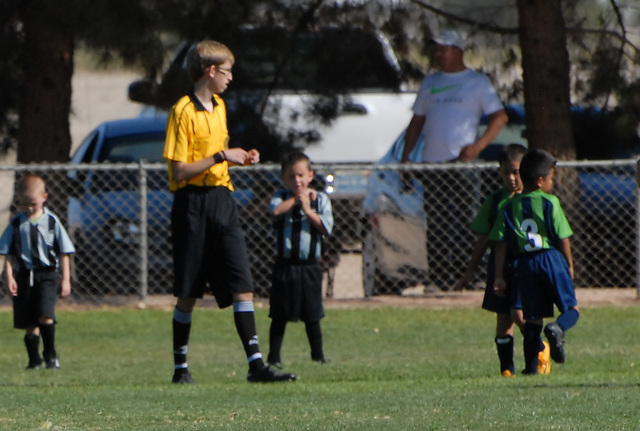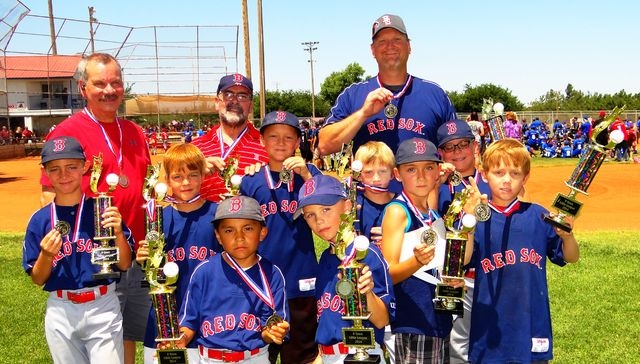Winning is good, but learning to lose is far more valuable
Competition, when is it beneficial and when is it not? Since the 60’s the thought has been that kids shouldn’t be exposed to losing. In many youth sports across the country participation trophies are given out to everyone, with the thought that losing is too devastating for children to participate in.
Now the winds are changing and losing is back in style says Ashley Merryman in a New York Times article titled, “Losing is good for you.”
“Children make mistakes, our job should not be to spin those losses into decorated victories,” Merryman said. “Instead, our job is to help kids overcome setbacks, to help them see that progress over time is more important than a particular win or loss, and to help them graciously congratulate the child who succeeded when they failed. To do that, we need to refuse all the meaningless plastic and tin destined for landfills. We have to stop letting the Trophy-Industrial Complex run our children’s lives.”
Trojans coach Pam Larmouth says this is a controversial topic, but she agrees with Merryman that kids need to learn to lose. She tells her athletes that the competition is within ourselves. Will you be a better player today than you were yesterday? Will you set and reach goals in your sport activity? This year with her players her mantra was that the only competition they had on the field were with the girls that were willing to play harder than they were. It doesn’t matter if they keep score or not, every player knows how many goals their team scored and so do the parents.
“I will tell you what I tell my athletes and you can decide if I think everyone should win,” she said. “I think what is important is that athletes learn to lose, learn good sportsmanship and learn to compete against themselves. How will kids become better students if they are not trying to improve their grades every day? How will they understand the adult world where competition for jobs, scholarships, college entry, sports, buying houses, and getting promotions are all based on competition?”
Larmouth believes winning is not everything and shouldn’t be the end-all of sports activity, but it should be the goal so that the teams have something to work toward.
“I am pleased with my athletes whenever they do their best, win or lose. But winning is a marker that reflects you are doing your best and that you and your team are where you want to be performing,” she said.
As far as not learning to lose hurting athletics, the problem that she experiences most is concerning equal playing time. This concept of “everyone is a winner” does hurt competitive sports because it fosters confusion from parents and athletes. She has many parents and athletes that expect that if they make the team they deserve playing time. She even had to have parents and athletes sign a contract stating that playing time is not guaranteed just because you are on the team.
“I have had players who work harder than others on the field, but because they lack speed or ball handling skills they don’t get as much playing time,” Larmouth said. “It seems unfair both to the parents and the students and is one of the worst aspects of coaching. However, it is important for athletes to know their limitations so they can concentrate on their strengths and work on their weaknesses. If everyone got equal playing time, each athlete would assume what they know and can do is at the starting player level when it isn’t. We would like to protect our youth from hurt, but in the long run we want them to be realistic, goal setting, goal reaching, productive adults.”
Larmouth believes kids need to have some kind of understanding of good, better and best, so they can make life decisions based on the knowledge of their strengths and weaknesses.
“I have had girls when I first started coaching that because their previous coach allowed them to play equally, thought that they could go on to play for colleges when in reality they wouldn’t have gotten much playing time on anyone’s team,” she said.
Beatty Hornets Coach James Robertson also agrees with Larmouth. He had several problems with playing time. He believes students should be learning about the world at around high school if not sooner.
“You have to know the truth about the world,” Robertson said. “You have to have goals and it takes hard work to achieve them. I think in the end false praise will do a kid more harm than good. I think when my kids ask me to play, they get spoiled by me because I try to play everyone every game. This year, some that were not on the first team got upset during a game because they didn’t play as much. I told them, ‘You need to come see me after the game and I will tell you where you are lacking an what you need to improve on to play more.’ I had to tell them that there are games you won’t get in.”
In the American Youth Soccer League, the local chapter does not keep score up until 8 years of age, but this varies with the chapter. Some chapters never keep score and others introduce competition at a later age. What is the right age to lose?
At what age should kids learn to lose? Merryman believes it should start at a younger age and kids should not be shielded. Ed Kirkwood is the Trojans Athletic Director and is a retired school teacher and coach. Before arriving to Pahrump, Kirkwood coached for nearly 40 years in just about every sport from elementary to college. He was surprised that AYSO didn’t keep score, but did experiment with this himself as a PE teacher. He says though by the fourth grade kids should be exposed to losing.
“I can see the need to recognize everyone during the developmental level of a child from kindergarten to about third or fourth grade,” Kirkwood said. “But by the time they are at 9-10 they should be keeping score. I think that is part of the problem, we coddle kids too much. There will be games you are going to win and some you will lose. I taught for 35 years in elementary physical education. You can be playing a game of kick ball with first graders and even if you are not keeping score, they know. I have tried not keeping score and everyone getting a trophy, but the kids keep score in their heads. I did this for years but the kids knew it anyway. As it gets more competitive, you just got to keep score.”
He said as the kids get older they should be more familiar with losing.
“I have coached at the middle school and kids are competitive. By the time you are in middle school you are going against other towns and it was for real. You learn some of your best lessons in athletics after a loss. It’s easy to be a good guy after a win, but after getting beat, can you keep your chin up and take something positive from a loss?”
According to Kirkwood, another problem might be the coaching at the younger ages. Some coaches can be too serious and the kids get turned off. This all leads to being an adult.
“Kids have to learn to cope with not winning all the time and have a thicker skin,” Kirkwood said. “I think that competition is good. I think kids are capable of handling things at 9 years old, if the parents aren’t screaming at each other and at the coaches.”

















